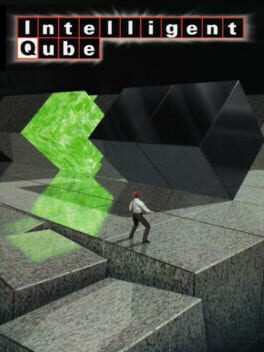▲
1
▼
According to a 1997 interview with the game's designer Masahiko Sato published in The PlayStation magazine, "in April 9th, on a Sunday afternoon, 2 or 3PM", out of nowhere, he came up with the idea for I.Q. that was "just like" the final game that was later released. After being asked again if the final version was the same as the original idea, he repsonded:
"Excluding the music, yes—visually it was almost exactly the same. I saw humans standing in an abstract, open space, with giant cubes coming at you. There were about 7 people, and in my initial vision, there were also dogs."
"At that time, I also imagined that, in addition to cubes, there would be blocks with more complex shapes: ones that were two stories high, for instance, or ones were more flat and oblong. However, when I actually made them, I realized that they made the game incomprehensible to human beings. The problem was that once the blocks became too complex in shape, people could no longer predict how they would move. Once I got into the actual development and created rules that humans could actually predict, that was when I first discovered the gameplay of I.Q."
"Gameplay, to me, is about finding the right balance. For example, take a game like Tic-Tac-Toe: it has a simple 3×3 board with players alternating between Os and Xs. This kind of game is easy to understand just by looking at it. But on the other hand, you have games like Othello and Go, which introduce a degree of non-intuitiveness that I think is handled well. When I ask myself why these games have continued to be played for so long, I think it’s because they strike just the right balance in having a moderate degree of complexity."
"My own initial image for I.Q, however, was far too complicated. It was too difficult and hence not very interesting. Gradually I refined the gameplay and the game changed accordingly."
"However, despite changing the number of humans on the game board, the one thing that remained nearly the same as my initial vision was the tone and atmosphere of the game."
Related Games
Samurai Shodown III
The Playroom
Hogs of War
Uncharted 2: Among Thieves
Crash Bash
Wild Arms 2
Ratchet & Clank: Up Your Arsenal
Flower
Tomba! 2: The Evil Swine Return
Trapt
Gran Turismo 2
Journey
LittleBigPlanet 2
Shadow of the Colossus
Gangs of London
Spyro the Dragon
Spyro 2: Ripto's Rage!
Disney's The Emperor's New Groove
Star Wars: Dark Forces
Dark Cloud 2
Mega Man X4
Legaia 2: Duel Saga
Jumping Flash!
Until Dawn
Gex
Sly 2: Band of Thieves
Bushido Blade
Ratchet & Clank: Going Commando
Aconcagua
Crash Bandicoot
Bloodborne
Infamous
Real Bout Fatal Fury
Kingdom Hearts
Destruction Derby
Freedom Wars
Resident Evil: Revelations 2
The King of Fighters '95
Siren
Heavy Rain
LittleBigPlanet 3
Tekken 4
Jak II
God of War: Chains of Olympus
Tobal No. 1
SOCOM 3: U.S. Navy SEALs
PlayStation All-Stars Battle Royale
Toro to Kyuujistu
MLB 15: The Show
The Unfinished Swan
